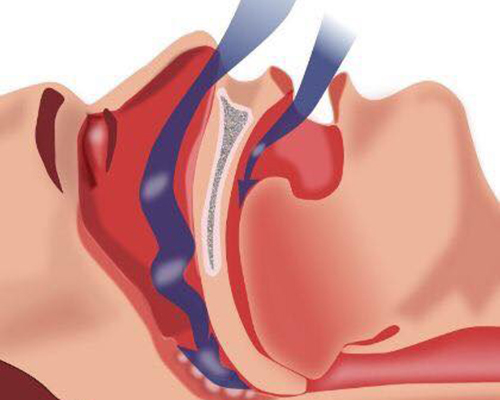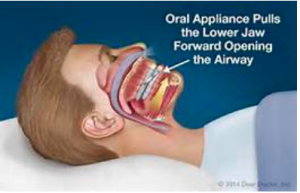Snoring is Dangerous for your Health

 We value our relationship with our patients and care about your overall health. As your dental care provider, we have the prime opportunity to play an important role in screening our patients for a serious sleep disorder called Obstructive Sleep Apnea. We most often are examining the oral cavity once or twice yearly, so this gives us the chance to examine the soft tissues and evaluate the risk for sleep apnea. (large tongue, scalloped tongue, tooth grinding, recessed jaw and airway). It’s important for you to know that your snoring isn’t something you should dismiss or take lightly. Snoring is dangerous to your health!
We value our relationship with our patients and care about your overall health. As your dental care provider, we have the prime opportunity to play an important role in screening our patients for a serious sleep disorder called Obstructive Sleep Apnea. We most often are examining the oral cavity once or twice yearly, so this gives us the chance to examine the soft tissues and evaluate the risk for sleep apnea. (large tongue, scalloped tongue, tooth grinding, recessed jaw and airway). It’s important for you to know that your snoring isn’t something you should dismiss or take lightly. Snoring is dangerous to your health!
Did you know that while obstructive sleep apnea (OSA) carries a significant risk for early death, even mild sleep disorders such as snoring can be related to heart disease, reduced sexual function, and other problems? Snoring does more than just keeping your partner up at night. It also increases the risk of stroke, and other diseases.
You may think of snoring as a sometimes annoying or embarrassing side effect of sleep. But before you discount your snoring as nothing out of the ordinary, consider this: People whose snoring is caused by severe OSA have a 40% greater chance of premature death than do their peers. That’s because this sleep disorder is related to a host of health problems, from heart disease to depression.
The good news is that most cases of OSA and snoring can easily be treated with a custom fabricated Oral Appliance that we can provide. However, you will need to take a sleep test to confirm if you have OSA, or if you have primary snoring without associated OSA. If you know or suspect you have sleep apnea, or you snore, here are eleven serious health conditions linked to snoring and sleep apnea that you should know about.

Stroke – data has shown that the intensity of snoring was related to the risk of carotid atherosclerosis – narrowing of the arteries in the neck due to fatty deposits called plaque, significantly increase your risk of stroke. Simply put, the louder and longer you snore each night, the greater your long-term risk for stroke.
Heart Disease – We know that sleep apnea is linked to cardiovascular problems, such as high blood pressure and coronary artery disease, eventually leading to possible heart attacks. In fact, data suggest that people with sleep apnea are twice as likely to have both nonfatal heart disease events and fatal heart attacks.
Decreased Sexual Function – studies have shown that those who suffer from sleep apnea, have a decreased amount of testosterone that is produced while we sleep. When this sleep is interrupted from sleep apnea, production is affected. Approximately 70% of men who sought treatment for sleep apnea, also had erectile dysfunction. In women, loss of libido and sensation were common in those who have sleep apnea. The good news is, that getting treatment for your sleep apnea, whether by Oral Appliance, CPAP, or weight loss, usually gets you back in the game.
GERD – gastroesophageal reflux disease, or GERD, is very common in people with sleep apnea. People who have sleep apnea also may have GERD because of the disordered way in which their throat closes while air moves in and out during sleep, causing pressure changes that can suck the contents of their stomach back up into the esophagus.
Injury – This is one of the more serious dangers of sleep deprivation caused by snoring or sleep apnea. Daytime sleepiness can be so intense that it puts you and the people around you at risk. If snoring or sleep apnea is leaving you exhausted, you run the risk of falling asleep, perhaps while driving. In 2014, there were 846 fatalities recorded due to drowsy driving.
Mental Health Issues – sleep apnea can affect your mental well-being, leading to issues from crankiness from a lack of sleep to serious depression. Researchers at the Centers for Disease Control and Prevention (CDC) found that men with diagnosed sleep apnea are more than twice as likely as other men to exhibit signs of clinical depression, such as feeling hopeless and uninterested in everyday activities. The picture was even worse among women: A sleep apnea diagnosis increased the risk of depression symptoms fivefold.
Headache – Do you often wake up with a headache? It’s not just from your spouse complaining about your snoring. According to a recently published study of 268 people who were habitual snorers, researchers found a connection between frequent morning headaches and sleep disorders including insomnia and sleep apnea.
Nocturia – getting up to use the bathroom 2 or more times a night is a condition called nocturia. For some people, this includes a loss of bladder control. It is also linked with snoring in both men and women. Research suggests that men over 55 who wake up often to urinate may have both benign prostate enlargement and OSA. For older women, bed wetting can be a symptom of having untreated sleep apnea.
Fetal Complications – Snoring during the last trimester of pregnancy is usually due to weight gain. Of greater concern, is that this snoring is also accompanied by an increased risk for fetal complications. Sleep apnea is associated with gestational hypertension, diabetes, and unplanned Caesarian sections. It may also lead to fetal growth restriction and prolonged labor.
Excess Weight – Half of overweight people also have sleep apnea, but that doesn’t mean sleep apnea doesn’t affect people of normal weight. People with a slender build can have sleep apnea due to the anatomy of their airway, if that airway is narrow, then most likely they will suffer from OSA. Extra weight around the neck can make it harder to breath laying down, thus those with larger necks, often have OSA. Men with a neck circumference of 17 inches, and 16 for women, are at greater risk of having obstructive sleep apnea.
Arrhythmias – people with long-term snoring or sleep apnea risk developing an irregular heart rhythm, or arrhythmia. Researchers have found that people with sleep apnea are more likely to have episodes of atrial fibrillation, the most common type of arrhythmia, than people without it or people whose apnea is treated with CPAP. Apnea may affect the conductive system of the heart, or it might be more common because obstructive sleep apnea appears to enlarge the left atrium over a long period of time.
Raymund Tanaka, DDS, MAGD, PLLC and Cynthia Leong, DDS, MAGD
18301 N. 79th Avenue, Ste. F-160 , Glendale, AZ 85308 623-878-2600 www.rmtanaka.com
March 13, 2019
